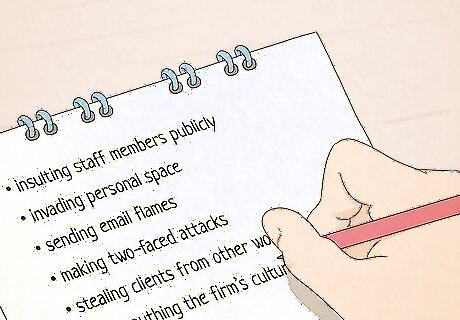
views

Try to pinpoint why you find your boss or manager to be annoying. There are any number of reasons possible, but don't fall into the trap of finding your boss annoying just because he or she asks you to do your job to an expected standard when you can't be bothered! The real elements of an annoying boss include feelings on your side that the workplace has become unbearable, disrupted, not enjoyable, and perhaps even frightening, because of the actions of your boss, coupled with the reality that your boss has certain undesirable traits or responses when interacting with staff. Signs of a manager who is annoying might include: A manager who is not supportive of staff and works to undermine staff, or who even steals the glory for work completed well by others. A manager who is deceitful and either lies about performance of workers, or fails to praise or point out when work is done well. A manager who threatens excessive or inappropriate outcomes for work not completed on time, or in a certain manner. A manager who doesn't take responsibility for errors but uses workers as scapegoats and blames staff when things go wrong. A manager who practices favoritism in the work place, setting some workers above others for no apparent reason. A manager who publicly humiliates, condescends, demeans, verbally attacks, or name calls staff. A manager who hasn't got the slightest interest in your personal life, and goes so far as to not support you when you have family crises or other personal issues that need attending to during work time. A manager who acts superior all the time, believing their own abilities far above anyone else's, and expects everyone to snap to attention, or else.

Recognize the actions of an annoying manager. As well as determining how the manager behaves towards staff, and knowing how this leaves you feeling, it can be helpful to identify certain unacceptable actions that annoying bosses commit regularly. They can include such actions as: Insulting staff members in a very personal manner, often publicly. Invading your personal space without asking Threatening you verbally or non-verbally Sending email flames Interrupting you rudely during meetings Giving you dirty looks Acting as if you are invisible when it suits them Withholding praise even though you clearly deserve some Second-guessing all the time or demands perfection Making sarcastic jokes or teasing you as a means to deliver a nasty message Reminding you in front of everyone where you stand in the hierarchy Touching you when it's clear that you don't want this Making two-faced attacks – you understand one thing from your boss, only to learn later that your boss said something opposite to somebody else Stealing clients or accounts from other workers Bad mouthing the firm's culture Refusing to help or explain anything when asked (but will deny this if pressed by anyone else, and insist it was you who didn't ask for help), etc.!

Keep the attacks on you separate from your self-esteem. Understand that even though it may feel otherwise, this behavior is, overall, not a personal attack against you as a worker or as a person. Most often these managers are trying to prove a point to higher level management by being "seen" to be doing the right thing, by directing their energies upwards and not caring for staff.

Such a boss may come around the office, department, etc., looking for errors to disqualify, or to discredit someone else whom they consider a potential threat. It is vital that you do not take this personally but see it for what it is – your boss's inferiority complex trying to masquerade as fake confidence by using staff as a tool to cover up his or her own inadequacies. When you try to see it this way, you are doing what is known as "reframing", to reduce the damage the situation does to you. Robert Sutton explains the trick is not to expect your annoying boss to change (that's unlikely to occur) but to expect the worst from your boss while expecting that you will remain fine once the ordeal is over.

Lower your expectations of your boss and focus on what is good about your job.

Be a model employee. Familiarize yourself with work protocols and understand the principles behind what you do. In other words, be prepared to offer a plausible explanation if questioned by your manager. This will also provide a suitable excuse to keep him or her away from rattling you further. Be one hundred percent across your job description and be able to respond as to how whatever you are doing fits within those parameters. It may sound silly but there are plenty of employees who don't understand fully what their role is, and can become a target of a bullying manager as a result. If you do extend yourself beyond your job description, be prepared with sound reasons for why you did this, how it has not interfered with your usual duties, and how it benefits your boss. Earn respect by showing confidence in your work. Be organized and manage your time efficiently. Do not create any opportunities for your annoying manager to call you out for breaking company policy or rules. Adhere strictly to break and lunch times, avoid leaving before your hours are up, and be on duty a few minutes earlier rather than being a few minutes late. Meet your deadlines, or keep people properly informed where deadlines are blowing out. Do not give an annoying boss any reason to find fault with your work or with you as a worker.

Demonstrate your expertise without arrogance. In a subtle way, outdo an annoying boss with your obvious knowledge. Aim to highlight your expertise and deter an annoying boss from prodding you any further. If your expertise is clear and highly respected, an annoying manager will usually back off, knowing that pursuing a petty issue with you can make them appear stupid if they cannot keep up with your points. Do not be arrogant, but display professional etiquette and confidence when making your points. Seek small wins instead of looking for the knock-out punch. While the larger problem of your annoying boss isn't going to go away, a series of small wins can boost your confidence, build up a more solid workplace positioning for you, and encourage others to do the same as you, which could ultimately undermine your boss's approach and wrest back more control for you and your colleagues.

Maintain a professional distance and limit your contact with your annoying manager. Implementing and maintaining boundaries can improve your every day work life. Keep a relatively safe working distance by avoiding personal conversations, keeping away, or revealing any information that could be used against you in the future.. Avoid meetings with your annoying boss where possible, or keep them short (look for a room without chairs). A fair amount of mystery is great for keeping you under the radar, and makes for interesting contemplation on the part of your manager. Don't give in to becoming one of the boss' "favorites". Not only can this so-called favored position change at a mere whim, but not being in this position also means that when top management gets wind of how poorly this manager is doing, you won't be tarred with having been compliant with this manager's behavior or favoritism.

Keep any unavoidable confrontation constructive. Stick to the facts, stick to what you do know, and don't lash out and criticize the boss. Learn to think on your feet. Many annoying managers have poor interpersonal skills, which is why we find them annoying. These types are bound to throw questions at you, at the most inappropriate of moments, catching you off-guard or when they know you will falter and stutter. This reflects a power play, a person who is insecure. Always remember this at the back of your mind, as this will help you to cope effectively, knowing the true reason behind the aggressive behavior. Excuse yourself politely when any confrontation becomes unbearable. If you are losing control during a confronting interaction or you experience difficulties explaining yourself and being understood, make an excuse, and walk away. Go to the bathroom, have a cigarette, throw M&Ms around in the car park, etc., but do not stay in the situation and get yourself dragged in further.

Learn to relax in the presence of your annoying manager. Being nervous or intimidated will only make you an easier target at work and most often you will end becoming their mental punching bag. Staying calm is a form of control of the situation in itself, and an effective one provided you can maintain it. Don't perceive yourself as a victim. Don't respond in kind; instead, see yourself as remaining calm, detach yourself emotionally from the annoying manager, and don't try to control what is out of your control. Focus instead on what you can control and on helping others who matter to cope too. Realize that staying calm can infuriate a person unable to control their own angry emotions. Don't let their lack of self-control unnerve you – just observe it for what it is. Find allies. Find those you can trust and share strategies for coping. Try daily affirmations or meditation to help you to remain calm. Take deep breaths and count to 10 before replying to a jibe or other annoying attack from your manager. Think of the chefs on Hell's Kitchen who respond "Yes Chef!" and nothing more! (You find out later what they are feeling and thinking!)

Do not fall prey to workplace gossip and bickering about anyone. Sometimes an annoying manager will try to extort negative reports on you from others. While disappointing, if people know you are gossiping about them, they will give a negative report about you when a boss goes behind your back. This results in filtered information, which becomes more distorted as it transfers from person to person and this creates the wrong impression, potentially damaging your professional reputation in the process. Avoid falling victim to this destructive behavior by not undermining your colleagues.

Find buffer zones. Have rooms where you (and your colleagues) can go and have time out after being around your annoying manager. Let off steam and support one another. Just be careful that this is a safety zone, and there isn't a possibility of your annoying manager walking in. If so, look further afield, such as a cafe, a neighboring park, etc. For example, nurses can hide away in nurse's lounge away from doctors, or techies in a common room where bosses never are known to go. Balance the advice on not gossiping with constructive discussions about your boss' poor behavior. It is possible to talk about the facts rather than belittling a person with rumors. Get the mixture accurate and you'll be supported by your coworkers.

Find other suitable employment if the work environment becomes unbearable. Another suitable alternative would be to look for other positions in the same workplace, if there are any available, such as a lateral move into another department. When you do move, however, be circumspect about your boss and your feelings for this person; people are not impressed by a potential new employee mouthing off against a former boss.















Comments
0 comment